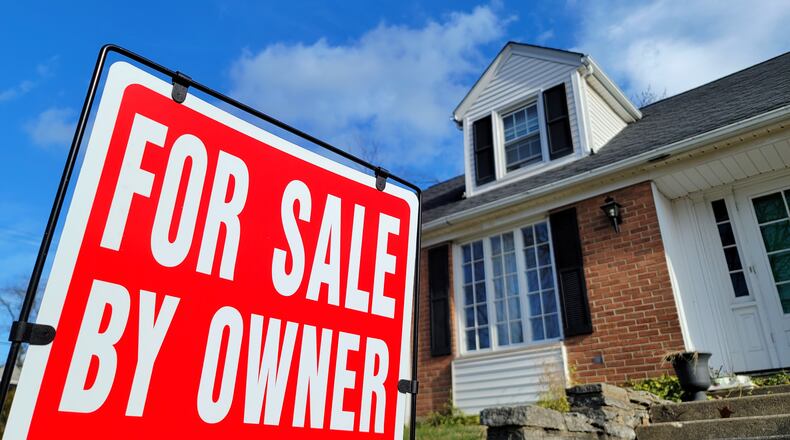“We’ve been spoiled for years (with low interest rates),” she said. “It’s still a ‘sellers market’ even with the inventory of homes down. We’re seeing the start of houses going on the market and receiving multiple offers in hours.”
In April, home sales reported to Dayton Realtors were down 3% in the Dayton area compared to the same time a year ago.
Over the past year, the market has seen prices continue a significant upward trend, with the average price improving nearly 10% to $245,429 and the median price increasing 11% to $212,000, according to the organization.
Dayton Realtors said the overall number of single-family homes and condominiums available in the MLS stood at just 945 at month’s end, which represented a supply of less than one month, based on April’s pace of sales.
Duncan-Heart said the prices of materials and other goods used in home construction are contributing to higher home prices. In addition, rent prices are also going up, she said.
Lack of inventory has caused problems for buyers.
Duncan-Hart said it’s frustrating for new home buyers to find a home they want, put an offer in and find themselves in a bidding war with other prospective buyers. She also said that sellers are not participating in any “extras” when selling a house such as home warranties or assisting with closing costs.
“We need more houses and more new construction,” Duncan-Hart said. “If you can afford to buy a house, you should because it’s still better than renting.”
Her advice to homebuyers was to “hang in there.”
Duncan-Hart said potential homebuyers should work with an experienced real estate agent and “have their ducks in a row and ready with preapproved financing letter and down payment because it’s a fast moving market.”
Another Realtor, Austin Castro, agreed that it’s still a “sellers market.”
“There has been a minor slowdown in housing due to the uptick in interest rates but you still have a group out there looking for houses and the rates are more important than prices,” he said. “It’s causing some people to think twice before buying a house.”
Castro cited the ease in the housing market and a decline in the stock market are other reasons for the reluctance. “It’s not as crazy as it was six months ago,” he said.
While interest rates are above 5% now, Castro said that is still a great rate considering the past 30 years of where interest have been. He said while the rates have increased, many potential buyers are locking in their interest rates now if they are making a long-term purchase for seven to 15 years.
“And if the interest rates go down, those buyers can also refinance,” he said.
Castro said few homes are sitting long on the market and most have multiple offers from buyers.
“It’s a little slow, but we are absolutely not having a recession like we had in 2008,” Castro said.
The average long-term U.S. mortgage rates retreated modestly this week, but interest on the key 30-year loan remains at decade-high levels, according to the Associated Press.
Mortgage buyer Freddie Mac reported Thursday that the 30-year rate slipped to 5.25% from 5.3% last week. By contrast, the average rate stood at 3% a year ago.
Earlier this month, the Federal Reserve intensified its fight against the worst inflation in 40 years by raising its benchmark interest rate by a half-percentage point and signaling more big rate hikes to come. The Fed’s move, its most aggressive since 2000, will mean higher costs for mortgages as well as credit cards, auto loans and other borrowing for individuals and businesses.
Last week, the government reported that U.S. producer prices soared 11% in April from a year earlier, a hefty gain that indicates high inflation for consumers and businesses will linger in the months ahead. In a separate report last week, government data showed that consumer prices jumped 8.3% last month from a year ago, just below the 8.5% year-over-year surge in March, which was the highest since 1981.
Homeownership has become an increasingly difficult aspiration recently, especially for first-time buyers. Besides staggering inflation, rising mortgage rates and higher home prices, the supply of homes for sale continues to be scarce.
Some economists predict that home sales this year could decline as much as 10% from 2021 levels.
“Economic uncertainty is causing mortgage rate volatility,” said Freddie Mac Chief Economist Sam Khater. “As a result, purchase demand is waning, and homebuilder sentiment has dropped to the lowest level in nearly two years.”
Khater noted that builders are also facing rising costs.
The average rate on 15-year, fixed-rate mortgages, popular among those refinancing their homes, slipped to 4.43% from 4.48% last week. That rate was 2.29% a year ago.
The Associated Press contributed to this report.
Dayton Real Estate Sales - April 2022 vs. April 2021
- Home and Condo Sales: 1,312 residential sales - down 3.32%.
- Average Sales Price: $245,429 average residential price - up 9.88%.
- Median Sales Price: $212,000 residential mean price - up 11.58%
- New Listings: 1,754 residential homes new listings - down 0.4%
- Year to Date Homes Sold - down 1.62%
Source: Dayton Realtors
About the Author

